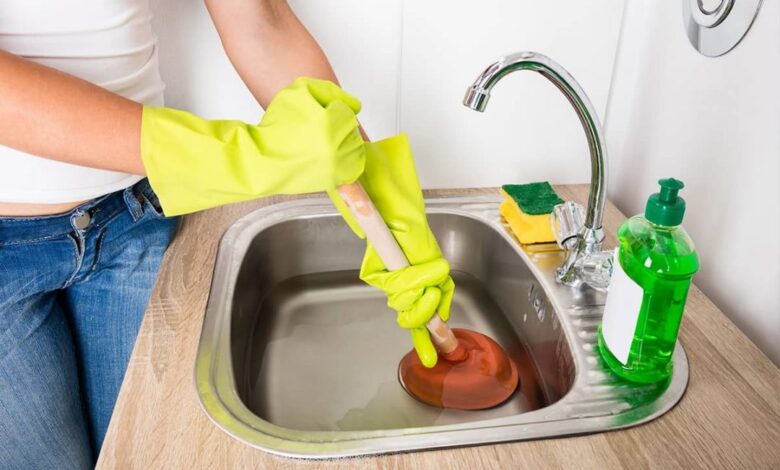Ways to Help Prevent Clogged Drains: Comprehensive Guide

Key Takeaways
- Practice Proper Disposal: Avoid pouring grease, oils, and food scraps down your drains to prevent clogs. Use a sealed container for grease and dispose of it in the trash.
- Use Preventative Tools: Install drain strainers and clean them regularly to block debris and hair. These affordable tools significantly reduce clog risks.
- Schedule Regular Maintenance: Flush drains with hot water monthly and schedule professional cleanings annually. Routine care extends the life of your plumbing system.
Maintaining clear drains ensures your plumbing works efficiently and avoids costly repairs. Drains often clog due to everyday practices, like improper disposal of grease or food scraps. Ignoring clogs leads to foul odors, slow draining, and eventual damage to pipes. Homeowners in Cape Coral and Fort Myers face unique challenges, such as humidity and saltwater exposure. Understanding these challenges helps residents adopt better drain care habits.
Understanding Drain Clogs
How Drains Function
Drains rely on gravity to carry wastewater away from your home. Pipes slope downward, ensuring water flows freely to sewer lines. Debris, grease, and other substances interfere with this flow, leading to clogs. Drainage systems include traps that hold water to prevent sewer gases from entering homes. Proper drain care maintains this system’s efficiency and keeps everything running smoothly.
Common Causes of Clogged Drains
Grease and oils solidify in pipes, creating stubborn blockages over time. Hair and soap scum combine to form tough tangles that clog bathroom drains. Food scraps and coffee grounds do not break down easily, causing clogs in kitchen sinks. Flushing wipes, paper towels, or other non-flushable items harms toilets and sewer systems. Regular maintenance prevents these issues before they cause damage.
Regional Factors in Cape Coral and Fort Myers
Florida’s climate creates specific plumbing challenges for local residents. Humidity accelerates mold and mildew growth, impacting drainage systems. Saltwater exposure in coastal areas corrodes pipes and increases maintenance needs. Homes built with older plumbing materials may experience faster wear and tear. Professional inspections address these issues and protect your home’s plumbing long term.
Preventative Measures for Homeowners
Proper Disposal Practices
Pouring grease or oil down drains leads to hardened buildups that block pipes. Dispose of grease in sealed containers and throw them in the trash. Use garbage bins for food scraps rather than relying on garbage disposals. Scrape plates and utensils into the trash to prevent food particles from entering the sink. Practicing these habits minimizes the risk of costly clogs.
Installing Drain Screens and Filters
Drain screens block hair, soap scum, and debris before they enter pipes. Use fine mesh screens in bathroom sinks and tubs for better protection. Clean screens regularly to maintain proper drainage flow. Kitchen strainers catch food scraps, making disposal easy while protecting pipes. Affordable and simple to install, these screens offer effective prevention.
Regular Maintenance Routines
Hot water flushes remove minor buildups from grease or soap residue. Combine baking soda and vinegar for a natural cleaning solution that breaks down debris. Let this mixture sit in your drains for an hour before rinsing with hot water. Repeat this process monthly to prevent clogs from forming. Consistent maintenance keeps your drains working efficiently.
Signs of Potential Clogs
Slow-draining sinks or tubs indicate blockages forming in your pipes. Gurgling sounds suggest trapped air caused by partial clogs. Water backups in unexpected places signal deeper plumbing issues. Foul odors from drains point to decomposing debris or food buildup. Address these signs promptly to prevent bigger problems.
3 Practical Tips
- Keep a grease container in your kitchen to collect oils and fats easily.
- Use drain strainers in every sink and regularly clean them to prevent blockages.
- Schedule annual plumbing inspections to address minor issues before they escalate.
These simple practices significantly reduce your risk of clogged drains.
Professional Solutions for Persistent Problems
The Role of Professional Plumbers
Plumbers use advanced tools to clear stubborn clogs without damaging pipes. Video inspections identify blockages deep within plumbing systems. Hydro jetting removes grease and debris with high-pressure water. Professionals assess your entire system, ensuring long-term solutions. Trusting experts protects your plumbing investment.
Benefits of Scheduled Drain Cleaning
Routine cleaning prevents buildups that lead to costly repairs. Professional services keep your system running smoothly and efficiently. Removing debris reduces the chance of emergency plumbing situations. Scheduled care extends the life of your pipes and lowers maintenance costs. Learn more about these services at North Fort Myers Plumbing Inc..
Avoiding DIY Mistakes
Chemical drain cleaners can corrode pipes and harm plumbing systems. Using improper tools may push blockages further into the pipes. Overusing plungers can damage seals or pipes, worsening the problem. Always follow safe and effective methods for DIY maintenance. When in doubt, contact a professional to prevent additional issues.
Special Considerations for Florida Residents
Unique Plumbing Challenges in Coastal Areas
Salt air accelerates corrosion in metal plumbing systems. High humidity fosters mold growth, impacting drainage efficiency. Sand and debris from outdoor activities often clog drains unexpectedly. Upgrading to corrosion-resistant materials helps combat these challenges. Professional advice ensures plumbing systems withstand Florida’s environment.
Preparing for Hurricane Season
Heavy rains during hurricane season overwhelm drainage systems without preparation. Clean gutters and downspouts to prevent water from pooling around your home. Ensure outdoor drains remain clear of debris before storms arrive. Install backflow valves to protect against flooding and sewer backups. Proactive steps protect homes during Florida’s rainy seasons.
Frequently Asked Questions
What is the best natural method for cleaning drains?
Use baking soda and vinegar for a safe and effective cleaning solution. Pour baking soda down the drain, followed by vinegar. Allow the mixture to sit for an hour to dissolve debris. Flush the drain with hot water to clear away loosened particles. Repeat monthly for optimal results.
Can drain clogs lead to more severe plumbing issues?
Yes, clogs often result in burst pipes, leaks, or sewer backups. Blockages increase pressure inside pipes, leading to potential cracks or breaks. Slow drains left unchecked can cause water damage over time. Addressing clogs quickly avoids costly repairs and ensures efficient drainage. Routine maintenance prevents these problems.
How often should I schedule professional drain cleaning?
Schedule professional cleaning at least once a year to maintain clear pipes. Homes with older plumbing may require more frequent attention to prevent issues. High-use households should consider bi-annual cleanings for optimal results. Regular care extends the life of your plumbing and minimizes disruptions.
Are there specific plumbing products recommended for Florida homes?
Yes, consider corrosion-resistant materials like PVC or CPVC for Florida’s humid environment. Use water softeners to reduce mineral deposits that harm pipes over time. Install high-quality drain strainers to prevent sand and debris from entering pipes. Consult a plumber for recommendations tailored to your specific needs.
Keeping Drains Clear for the Long Term
Commit to regular maintenance routines to preserve your plumbing system’s health. Educate family members on proper disposal habits and drain care practices. Address minor issues quickly to avoid larger problems later. Invest in professional inspections to identify hidden risks. Consistent care ensures your plumbing serves your home for years.
References
This document provides comprehensive guidelines on modern stormwater management systems designed to prevent flooding and remove pollutants, essential for maintaining clear drainage systems.
Learn about effective practices to prevent stormwater pollution, including proper disposal methods and maintenance tips to keep drains clear and functional.
Orange County offers insights into managing stormwater and debris, emphasizing the importance of keeping drainage systems free from obstructions to prevent clogs.
The City of Hialeah outlines strategies for protecting storm drains, including proper maintenance and disposal practices to prevent blockages and ensure efficient drainage.
Author
John Mitchell stands out as a seasoned expert in residential and commercial plumbing systems. With over 20 years of experience as a licensed plumber and specialized training in advanced drain cleaning and maintenance techniques, he has helped countless homeowners maintain efficient plumbing systems. Based in Fort Myers, Florida, John focuses on providing practical, environmentally friendly solutions tailored to the unique challenges of coastal living. His expertise includes preventative maintenance, stormwater management, and addressing regional plumbing concerns, such as saltwater corrosion. As a trusted voice in the plumbing community, John is committed to educating homeowners on sustainable practices that preserve their plumbing systems and protect local waterways.

